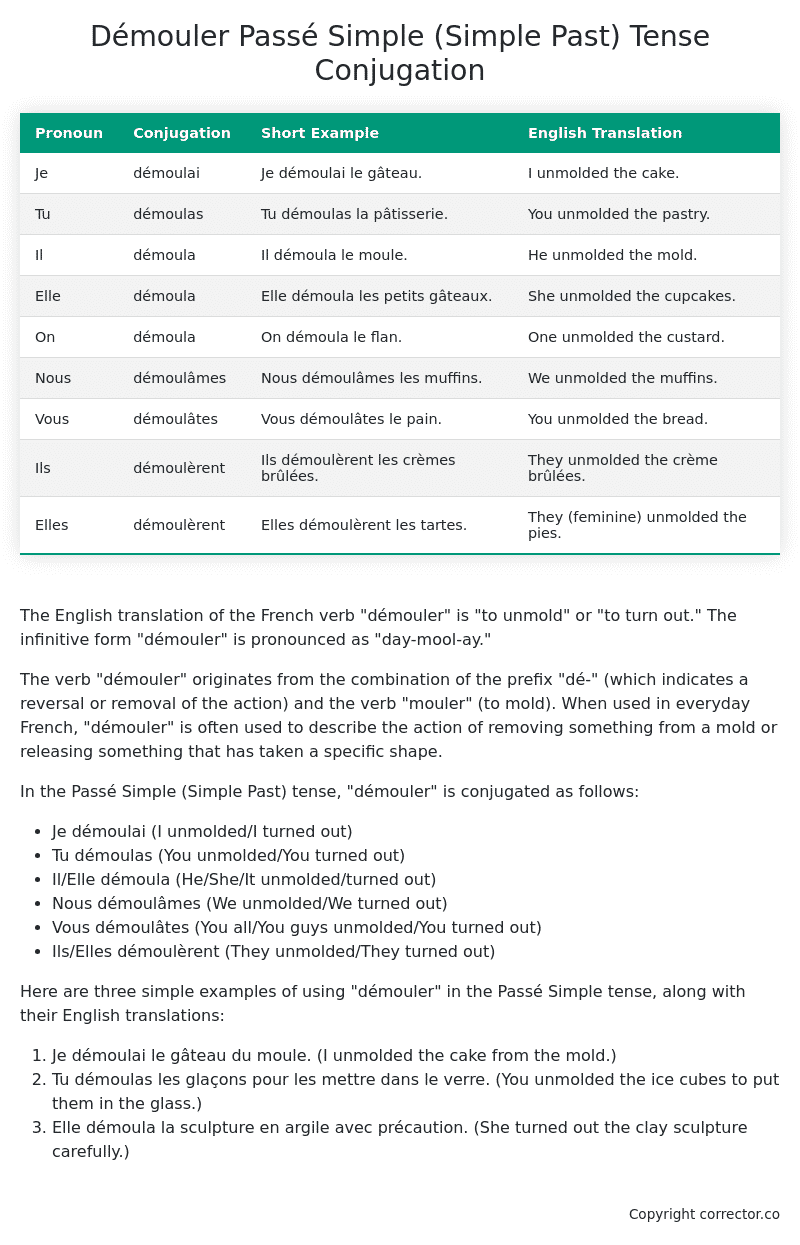Passé Simple (Simple Past) Tense Conjugation of the French Verb démouler
Introduction to the verb démouler
The English translation of the French verb “démouler” is “to unmold” or “to turn out.” The infinitive form “démouler” is pronounced as “day-mool-ay.”
The verb “démouler” originates from the combination of the prefix “dé-” (which indicates a reversal or removal of the action) and the verb “mouler” (to mold). When used in everyday French, “démouler” is often used to describe the action of removing something from a mold or releasing something that has taken a specific shape.
In the Passé Simple (Simple Past) tense, “démouler” is conjugated as follows:
- Je démoulai (I unmolded/I turned out)
- Tu démoulas (You unmolded/You turned out)
- Il/Elle démoula (He/She/It unmolded/turned out)
- Nous démoulâmes (We unmolded/We turned out)
- Vous démoulâtes (You all/You guys unmolded/You turned out)
- Ils/Elles démoulèrent (They unmolded/They turned out)
Here are three simple examples of using “démouler” in the Passé Simple tense, along with their English translations:
- Je démoulai le gâteau du moule. (I unmolded the cake from the mold.)
- Tu démoulas les glaçons pour les mettre dans le verre. (You unmolded the ice cubes to put them in the glass.)
- Elle démoula la sculpture en argile avec précaution. (She turned out the clay sculpture carefully.)
Table of the Passé Simple (Simple Past) Tense Conjugation of démouler
| Pronoun | Conjugation | Short Example | English Translation |
|---|---|---|---|
| Je | démoulai | Je démoulai le gâteau. | I unmolded the cake. |
| Tu | démoulas | Tu démoulas la pâtisserie. | You unmolded the pastry. |
| Il | démoula | Il démoula le moule. | He unmolded the mold. |
| Elle | démoula | Elle démoula les petits gâteaux. | She unmolded the cupcakes. |
| On | démoula | On démoula le flan. | One unmolded the custard. |
| Nous | démoulâmes | Nous démoulâmes les muffins. | We unmolded the muffins. |
| Vous | démoulâtes | Vous démoulâtes le pain. | You unmolded the bread. |
| Ils | démoulèrent | Ils démoulèrent les crèmes brûlées. | They unmolded the crème brûlées. |
| Elles | démoulèrent | Elles démoulèrent les tartes. | They (feminine) unmolded the pies. |
Other Conjugations for Démouler.
Le Present (Present Tense) Conjugation of the French Verb démouler
Imparfait (Imperfect) Tense Conjugation of the French Verb démouler
Passé Simple (Simple Past) Tense Conjugation of the French Verb démouler (You’re reading it right now!)
Passé Composé (Present Perfect) Tense Conjugation of the French Verb démouler
Futur Simple (Simple Future) Tense Conjugation of the French Verb démouler
Futur Proche (Near Future) Tense Conjugation of the French Verb démouler
Plus-que-parfait (Pluperfect) Tense Conjugation of the French Verb démouler
Passé Antérieur (Past Anterior) Tense Conjugation of the French Verb démouler
Futur Antérieur (Future Anterior) Tense Conjugation of the French Verb démouler
Subjonctif Présent (Subjunctive Present) Tense Conjugation of the French Verb démouler
Subjonctif Passé (Subjunctive Past) Tense Conjugation of the French Verb démouler
Subjonctif Imparfait (Subjunctive Imperfect) Tense Conjugation of the French Verb démouler
Subjonctif Plus-que-parfait (Subjunctive Pluperfect) Tense Conjugation of the French Verb démouler
Conditionnel Présent (Conditional Present) Tense Conjugation of the French Verb démouler
Conditionnel Passé (Conditional Past) Tense Conjugation of the French Verb démouler
Conditionnel Passé II (Conditional Past II) Tense Conjugation of the French Verb démouler
L’impératif Présent (Imperative Present) Tense Conjugation of the French Verb démouler
L’impératif Passé (Imperative Past) Tense Conjugation of the French Verb démouler
L’infinitif Présent (Infinitive Present) Tense Conjugation of the French Verb démouler
L’infinitif Passé (Infinitive Past) Tense Conjugation of the French Verb démouler
Le Participe Présent (Present Participle) Tense Conjugation of the French Verb démouler
Le Participe Passé (Past Participle) Tense Conjugation of the French Verb démouler
Struggling with French verbs or the language in general? Why not use our free French Grammar Checker – no registration required!
Get a FREE Download Study Sheet of this Conjugation 🔥
Simply right click the image below, click “save image” and get your free reference for the démouler Passé Simple tense conjugation!

Démouler – About the French Passé Simple (Simple Past) Tense
Formation
Usage
Narration
Historical Context
Interactions with other tenses
Passé Composé
Imparfait
Conditional and Subjunctive
Summary
I hope you enjoyed this article on the verb démouler. Still in a learning mood? Check out another TOTALLY random French verb conjugation!


